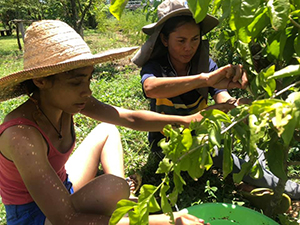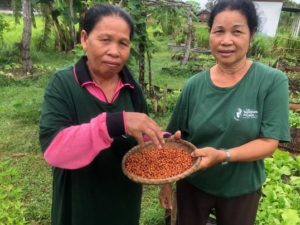
The Certified Permaculture Design Course is an important part of the life of every permaculture farmer. It allows you to learn all the basics of permaculture. … The goal for us is to make your transition as easy as possible, or the application of permaculture in your project and / or your life.
This is the standard for training, the content of which was developed by Bill Mollison, founder of permaculture.
It is taught in a tropical version adapted to our latitudes and our culture. This training allows you to understand and apply the fundamentals of the permacultural design method.
It is a training course of at least 72 hours of lessons which is spread over a fortnight in full integration.
It is both theoretical and practical.
The content of C.C.P. dispensed across the world are designed on a common basis created by Bill Mollison.
The course can be taught by one or more teachers, but it must take place under the coordination of a qualified designer in permaculture, guarantor of the quality of the teaching and the only one authorized to issue the designer certificate.
The modules can be taught either by the coordinator or by teachers specializing in their field.
At the end of the course, the coordinator gives the trainees the Permaculture Certificate. This certificate has no diploma value in the strict sense of the term but is a certificate of training follow-up. It allows whoever obtains it:
to continue learning permacultur
to commit to the permaculture diploma,
to teach a 2-day introductory course (subject to support for the first session (s) by experienced initiators to validate the content, tools, pedagogical approaches)



Permaculture: chapters of this training
Introduction (to permaculture)
Concepts and Themes in Design
Methods of Design
Pattern Understanding
Climatic Factors
Trees and their Energy Transactions
Water
Soils
Earthworking and Earth Resources
The Humid Tropics
Dryland Strategies
Humid Cool to Cold Climates
Aquaculture
The Strategies of an Alternative Global Nation
This course lasts two weeks and our prices include the course, the lodging as well as the daily meals.
25,000 THB per person in dormitory
30,000 THB per person in a private bungalow
45,000 THB for two people in a private bungalow



Your trainer: Neil Willman
Neil Willmann is from Chicago. Neil’s academic studies include a degree in oceanography from the University of Hawaii where he worked on recirculating marine aquaculture systems. He later returned to his hometown to complete another degree in physics. Physics, in particular thermodynamics, serves as the foundation for ecology in general and even specifically for the origins of much of permaculture design theory.
Neil has traveled, lived and worked in many parts of the world and recently (2007) moved to Thailand, about an hour outside of Bangkok. He currently teaches physics, energy studies and engineering design methodology at the Asian University of Science and Technology, where he also conducts research in ecological systems engineering using engineering mathematics to validate methods of eco-agrology (such as organic farming).
Neil is passionate about lifelong learning. “The only true ‘expert’ in ecological engineering design is nature. For this reason, permaculture design promises a creative and lifelong learning capacity that will always be rewarding. As for teaching permaculture, Neil says, “When it comes to teaching subjects like permaculture, ‘rewarding’ doesn’t even begin to describe the feeling of giving the gift of a fuller understanding of a complex subject like ecology; and a foundation of a design methodology that allows others to move forward with confidence and make meaningful change in the world.

Protection of biodiversity

One of the essential first steps for organic farming and self-sufficiency is to produce healthy and reproducible seeds!
Seeds are essential for humanity as they are the first step in the production of food. When they have been improved thanks to the intervention of the peasants, taking into account the particular local conditions, these seeds represent the cultural value of the traditions, knowledge and know-how on the use of biodiversity.

For our part, we of course work mainly with fertile organic seeds, thanks among other things to the partnership set up with the Kokopelli association… We produce winged peas seedsOur winged pea seeds for the Seeds Without Borders campaign, in return we receive vegetable seeds every year, we make a “fair trade”
What we also appreciate is receiving seeds from our visitors in order to increase the biodiversity of the farm. We appreciate it when our hosts bring seeds from their home country or from a country they have visited.
Sharing can also be done through what you bring… It’s a pleasure for us to have trees, flowers, vegetables from all over the world!
This exchange is of course a plus, and in no way an obligation.